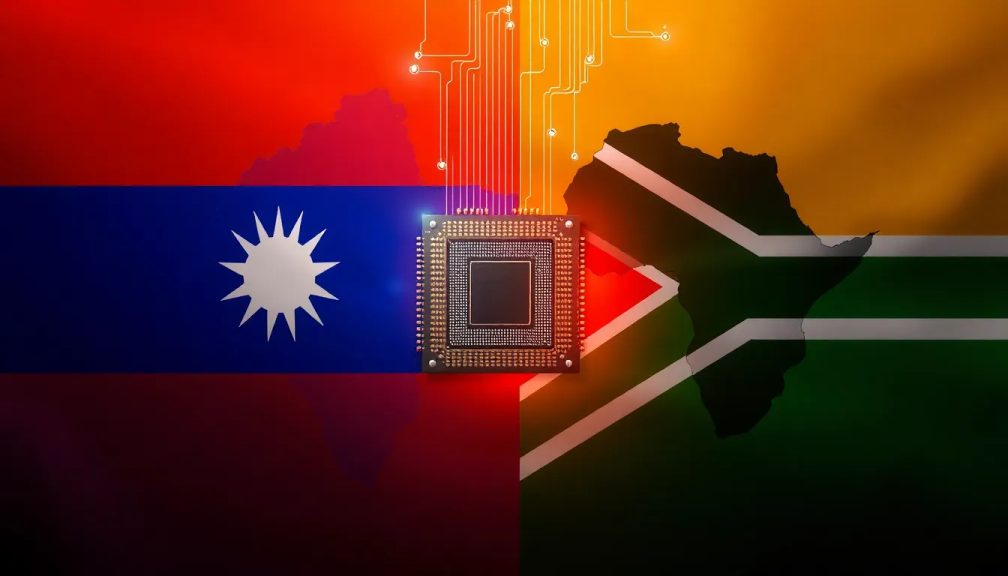Taiwan uses chip access as a weapon against South Africa

The intricate dynamics of global trade and diplomacy are taking a dramatic turn, especially in the tech sector. As nations navigate the complex landscape of international relations, the interplay between chip manufacturing and diplomatic strategies has become increasingly evident. In this context, Taiwan's recent actions regarding its relationships, particularly with South Africa, highlight a significant shift in how countries may leverage economic tools for diplomatic ends.
As Taiwan embraces a more assertive stance, the implications of its trade policies extend beyond mere economics, influencing diplomatic ties and strategic alliances worldwide.
Taiwan's strategic shift regarding trade and diplomacy
Recently, Guo, a high-ranking Chinese official, commended South Africa for relocating Taiwan's embassy and asserted that this move would lead to enhanced access to Chinese chips for South Africa. According to Guo, the trade dynamics reveal that Chinese chip exports to South Africa have outpaced those from Taiwan, with a reported tripling of trade volume in 2024 alone.
Guo's remarks suggest a clear message: Taiwan's diplomatic measures are not only futile but counterproductive. He stated that Taiwan's tactics would "only end in failure," underscoring China's position as the dominant player in the chip market.
This situation prompts a critical examination of Taiwan's diplomatic strategy and how it could affect various nations, especially those considered "unfriendly." The growing concern is that countries may soon find themselves navigating the geopolitical landscape shaped by Taiwan's economic policies.
Targeting other 'unfriendly' nations
A Taiwanese official indicated to Bloomberg that the island expects to increasingly employ economic and trade measures to achieve its diplomatic objectives. This approach hints at a broader strategy aimed at countries that Taiwan perceives as antagonistic.
The implications of this strategy could ripple across the global diplomatic landscape. Wen-ti Sung, a non-resident fellow at the Atlantic Council’s Global China Hub, remarked that other governments would likely scrutinize Taiwan's methods, weighing the benefits (the "carrots") against potential penalties (the "sticks").
- Countries may feel pressured to adjust their trade strategies.
- Access to Taiwan Semiconductor Manufacturing Company (TSMC) could become a lever for Taiwan.
- Impacts could extend to smaller trading partners, who might risk losing out.
While major economies like the US and many European countries may remain largely insulated from such tactics, Taiwan’s smaller allies could find themselves in a precarious position, compelled to rethink their relationships with Taiwan to maintain access to essential semiconductor technologies.
The influence of the US-China trade war
Taiwan's recent actions appear to be influenced significantly by the ongoing trade tensions between the United States and China. After previously aligning with US policies that restricted exports to Chinese tech firms such as Huawei and Semiconductor Manufacturing International Corporation (SMIC), Taiwan seems to be adopting a more proactive stance.
This shift aligns with the US government's hope that Taiwan would assume greater responsibility in regulating sensitive exports independently, rather than merely following Washington's directives. Min-yen Chiang, a non-resident fellow at a Taipei think tank, emphasized this expectation, suggesting that Taiwan is now taking bold steps to assert its agency in the global tech arena.
These developments signal a crucial transformation in Taiwan's diplomatic posture, as the island seeks to navigate a complex geopolitical environment.
The relationship between Taiwan and South Africa
The relationship between Taiwan and South Africa is multifaceted, shaped by historical ties and current geopolitical realities. Taiwan has maintained a presence in South Africa since the early 1990s, when diplomatic relations were first established.
However, the recent decision by South Africa to relocate Taiwan’s embassy has raised eyebrows and has been interpreted as a strategic pivot towards China. This move reflects broader trends in global diplomacy, where countries are increasingly aligning themselves with major powers based on economic incentives.
- Historical ties between Taiwan and South Africa date back to the early 1990s.
- South Africa's pivot towards China is indicative of shifting global alliances.
- The relocation of the embassy symbolizes a significant diplomatic shift.
As South Africa expands its cooperation with China, Taiwan may find it essential to reassess its diplomatic engagement strategies to maintain relevance in the region.
Potential consequences of Taiwan's chip diplomacy
The implications of Taiwan's diplomatic strategies centered around chip access may lead to several potential outcomes:
- **Increased geopolitical tensions:** Nations may find themselves caught in a technological tug-of-war.
- **Economic leverage:** Taiwan could effectively use its semiconductor prowess as a bargaining chip in international relations.
- **Impact on global supply chains:** Countries reliant on Taiwanese chips may face disruptions if diplomatic tensions escalate.
Furthermore, as Taiwan implements these strategies, it must navigate the fine line between asserting its interests and fostering relationships that support long-term stability in a volatile environment.
Conclusion: Taiwan's evolving role in global diplomacy
As Taiwan continues to redefine its approach to diplomacy through economic means, the global tech landscape is poised for significant changes. The interplay between chip manufacturing and diplomatic initiatives will likely set the stage for future international relations, as nations evaluate their alliances in response to Taiwan's evolving strategies.
In this new era, the balance of power in the semiconductor industry may not only influence technological advancements but also reshape diplomatic ties across continents.




Leave a Reply